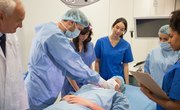Harvard University has a reputation for excellence recognized around the world, and it's ranked regularly among the nation's top universities. Its graduate Divinity School has the same reputation for excellence, and a Harvard Theology PhD can open the door to a wide variety of jobs and opportunities. As a result, admissions to the school are intensely competitive. The admissions committee reviews students based on overall academic profile, work and personal experience, GRE test scores and other indicators of academic ability and research interests. While there is no way to guarantee admission to any university, students can increase their chances of admission by getting the best grades and scores they can and assembling an exceptional application package.
Harvard Divinity School Acceptance Rate
Though Harvard does not publish precise acceptance rates for the Divinity School, estimates suggest that roughly half of the applicant pool are accepted to study at the school annually. With a total student population of under 400 for both masters and doctorate programs, this means that getting into the Harvard Divinity School will require a standout application. One of the best ways to set yourself up for success is to ensure that your academic scores are as high as possible.
Develop a Stellar Academic Record
Harvard Divinity School says it reviews the complete academic history of each applicant and takes into account the strengths of every application. As such, it doesn't set a minimum grade point average. However, admissions are competitive, and students who have the best grades will have the best chance of admission. The average GPA for undergraduate students admitted to Harvard is 4.1, according to "The Princeton Review." The Divinity School doesn't publish the average GPA for students it admits. Besides getting good grades, students who are interested in attending the Divinity School should take the most academically challenging curriculum they can to showcase their academic abilities, and choose coursework that is relevant to religious studies to show their dedication to the field.
Get Good GRE Scores
Applicants to Harvard's Divinity School must take the Graduate Record Exam revised general test. Though the admissions committee says grades, personal essays and recommendations are the primary criteria for acceptance, the GRE can provide valuable information about students' academic abilities, especially if they're making a career change from another field or did not complete a lot of humanities coursework as an undergrad. There is not a minimum score for the GRE and the school doesn't publish averages for admitted students. Students should try to get the best GRE scores possible to improve their chances of admission.
Write a Stellar Essay
All applicants must submit a 1,000-word statement of purpose, and applicants to the Master of Divinity or Master of Theological Studies program must also submit a 500-word essay. One criteria the admissions committee uses to select applicants is the fit between their goals and the program. Applicants can increase their chances of admission by reviewing faculty research projects and areas of study and aligning them with their own research goals. Students who have clearly defined research interests and whose research interests complement those of the faculty will have a better chance. If you'd like to find ways to adjust your interests to meld with those of Divinity School faculty, you can use the public-facing Harvard Divinity School email directory to get in touch with faculty to ask questions and establish dialogue around their research and specializations.
Get Strong Letters of Recommendation
The Harvard Divinity School admission requirements ask for three letters of recommendation. These letters are a good opportunity for the admissions committee to get to know an applicant's strengths, background and character. Students should ask professors, work supervisors or community leaders who are familiar with their academic and professional work to write the letters and touch on their accomplishments. Letters of recommendation are given weight in the admissions decision, so it's worthwhile for students to get the best letters they can. If you've communicated with Harvard faculty members and have established a solid relationship, a letter from that faculty member could be particularly beneficial – especially if you don't already attend Harvard as an undergraduate student.
Related Articles
References
Resources
Writer Bio
Maria Magher has been working as a professional writer since 2001. She has worked as an ESL teacher, a freshman composition teacher and an education reporter, writing for regional newspapers and online publications. She has written about parenting for Pampers and other websites. She has a Master's degree in English and creative writing.











